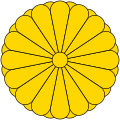Emperor Hanzei
Emperor Hanzei (反正天皇, Hanzei-tennō) was the 18th emperor of Japan,[1] according to the traditional order of succession.[2] Historians consider details about the life of Emperor Hanzei to be possibly legendary, but probable.[3] The name Hanzei-tennō was created for him posthumously by later generations.
| Hanzei | |
|---|---|
| Emperor of Japan | |
| legendary | |
| Predecessor | Richū |
| Successor | Ingyō |
| Born | legendary |
| Died | legendary |
| Burial | Mozu no Mimihara no naka no misasagi (Osaka) |
No certain dates can be assigned to this emperor's life or reign.[4] The conventionally accepted names and sequence of the early emperors were not to be confirmed as "traditional" until the reign of Emperor Kammu, who was the 50th monarch of the Yamato dynasty.[5]
Traditional history
According to Nihonshoki and Kojiki, he was a son of Emperor Nintoku. The eldest son would become known as Emperor Richū.
Hanzei was the brother of Richū. Hanzei's enthronement by-passed Richū's two sons. Few other details have survived.[6]
Events of Hanzei's life
Very little is known about the events of Hanzei's life and reign. Only limited information is available for study prior to the reign of the 29th monarch, Emperor Kimmei.[7]

Hanzei's reign is described as a time of peace. He died quietly in his palace.[8]
After his death
This emperor's official name after his death (his posthumous name) was regularized many centuries after the lifetime which was ascribed to Hanzei.[9]
According to the Imperial Household Agency, the emperor's final resting place is in an earthen tumulus (kofun) at Sakai. Hanzei is venerated at a memorial Shinto shrine (misasagi) which is associated with the burial mound.[1]
Emperor Hanzei Media
Japanese Imperial kamon — a stylized chrysanthemum blossom
Related pages
References
- ↑ 1.0 1.1 Imperial Household Agency (Kunaichō), 反正天皇 (18); retrieved 2011-10-16.
- ↑ Titsingh, Isaac. (1834). Annales des empereurs du japon, p. 25; Varley, Paul. (1980). Jinnō Shōtōki, p. 112; Nussbaum, Louis-Frédéric et al. (2002). "Traditional order of Tennō" in Japan encyclopedia, pp. 962-963.
- ↑ Kelly, Charles F. "Kofun Culture," Japanese Archaeology. April 27, 2009; retrieved 2011-10-16.
- ↑ Ponsonby-Fane, Richard. (1959). The Imperial House of Japan, p. 30.
- ↑ Aston, William George. (1896). Nihongi, pp. 109.
- ↑ Ponsonby-Fane, Richard. (1959). The Imperial House of Japan, p. 39.
- ↑ Titsingh, pp. 34-36; Brown, pp. 261-262; Varley, pp. 123-124.
- ↑ Aston, William. (1998). Nihongi, Vol. 1, pp. 310-311.
- ↑ Aston, pp. 146-147.
Other websites
16x16px Media related to Emperor Hanzei at Wikimedia Commons
| Preceded by Emperor Richū |
Legendary Emperor of Japan Hanzei 406-410 (traditional dates) |
Succeeded by Emperor Ingyō |
